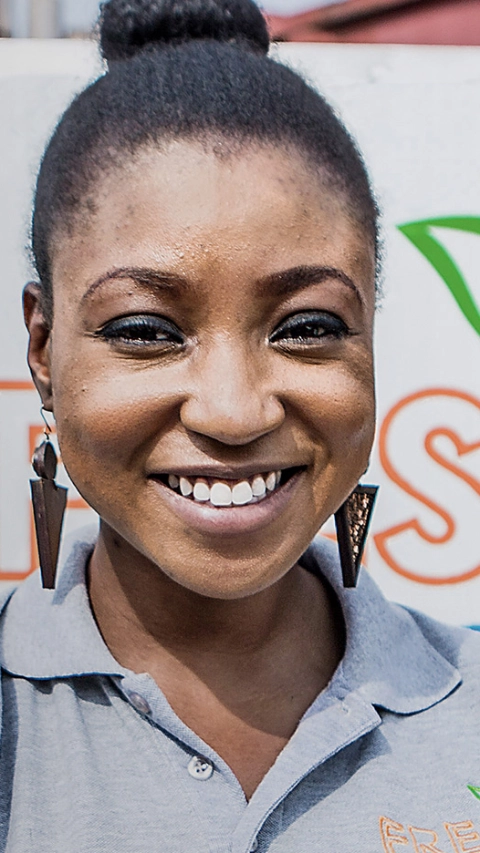21%
of Nigeria’s economy is made up of agriculture. It’s the largest source of employment.

Inspiration
With 85 million hectares of uncultivated arable land, why is Nigeria a net importer of food? Nigerian entrepreneur Angel Adelaja has set out to tackle this problem, using advanced technology to grow fresh produce.
According to the World Bank, Nigeria imported around $3.4 billion worth of vegetable products in 2014 and exported only $760 million. Yet it has vast areas of uncultivated arable land. With a population of 186 million, growing at 2.6 percent a year, improving food security means developing innovative approaches to agriculture.
This is the mission behind Fresh Direct, a startup founded by Nigerian entrepreneur Angel Adelaja. Her aim is to help Nigeria reduce its reliance on food imports by introducing advanced technologies to improve crop yields. Fresh Direct uses a hydroponic system in adapted shipping containers to grow produce. The production of vegetables from just one six-meter container is equivalent to that from around 6,000 square meters. When the containers are stacked on top of each other, the output per square meter of farm rises dramatically. Plants are grown under lights and without soil. Instead, they are suspended in nutrient- rich water and drip-fed water. This method means growing takes place 24/7.
Fresh Direct says it can achieve 10 times the yield of traditional farming, using one fifteenth of the land and a fraction of the water requirements. The company now has four containers at two sites in Abuja, the Nigerian capital. Six more containers are planned, as well as a warehouse in Lagos. In any given month, each container produces around 3,000 heads of vegetables, and the company, founded in 2015, is now earning enough money to reinvest and expand.
“It’s not a silver bullet,” says Adelaja. “The amount we produce is a drop in the bucket. What’s important is the synergy between traditional rural farms providing the bulk of the produce and our container farms focusing on crops that are mostly imported.”
To avoid competing with local farmers, Fresh Direct focuses on vegetables that are not grown locally and have to be imported, such as butterhead lettuce and blue dwarf kale. There’s enough land around the containers to farm fish, chicken and goats, too.
“We have two major customers that purchase most of what we produce, and then we have a little extra for our other customers,” says Adelaja. “We’re scaling to meet demand. Our market is where there are people interested in healthy eating. If you look at Lagos, Port Harcourt, Abuja, Kaduna, Kano – those are the places.” Growing the produce close to the city means Fresh Direct avoids the problems of poor transport infrastructure and high fuel costs. But it’s not just about output; it’s about people, too. Fresh Direct’s employees are mainly young, local people who benefit from training and higher-than-average salaries. Adelaja acts as a guarantor to help them obtain bank accounts and access the wider financial system.
21%
of Nigeria’s economy is made up of agriculture. It’s the largest source of employment.
Before setting up Fresh Direct, Adelaja worked with the national coordinator of the Nigerian president’s poverty eradication program. Youth unemployment in Nigeria stands at 7.8 percent. The government has set up initiatives such as micro credit and conditional cash transfer, but Adelaja felt more could be done to raise people out of poverty, so she looked for ways to directly stimulate the local economy.
Agriculture as a business is important. There should be more farms like this.”
Agriculture makes up 21 percent of Nigeria’s economy and is the largest source of employment. It therefore seemed the ideal sector to target. But Adelaja quickly realized that traditional smallholder farming techniques could not be efficiently scaled up, and poor rural infrastructure was also a problem. After initial research, she decided that hydroponics was the way forward. The idea of using shipping containers came to her while visiting a construction company. She and her partner then set about building a prototype in her yard.
“If you can’t push well-meaning policies into action and impact people’s lives then there’s no point. With Fresh Direct, I feel I’m impacting people’s lives. I’m creating jobs and opportunities,” she says. “Most of the young people who work for Fresh Direct had no previous agricultural experience. They were working as house helpers or janitors. We want to empower everyone that joins us.”
I feel I’m impacting people’s lives. I’m creating jobs and opportunities.”
Fresh Direct’s success has caught the attention of development agencies. In 2017, Adelaja won the World Economic Forum’s award for “breakthrough female technology entrepreneur.”
“We’ve had a lot of interest, and that’s been helpful. People have contacted us from Senegal, Ethiopia and other places because they want to replicate what we are doing. Now we’re thinking about how to create a franchise model,” she says. The plan is to expand in Nigeria, then test the market in places such as Dakar, Senegal, and Accra, Ghana. “Longer term I see Fresh Direct across West Africa and even East Africa as well,” says Adelaja. “I want to see a system where people are employers and entrepreneurs. I want success stories – I want this to be what government can’t do.”


